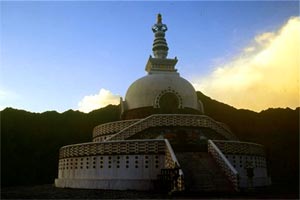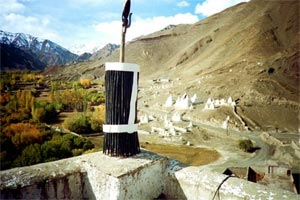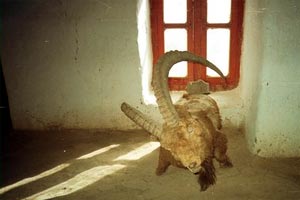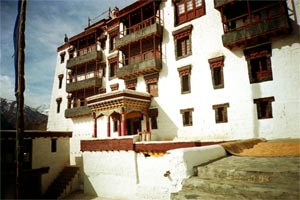|
Leh
Palace and Monastery Circuit
Descending further back we took a turn for the Leh Palace.
This nine-storied crumbled structure that towers over the
Leh old quarter was the residence of Royal family of Ladakh.
But today it is in ruins I must say. The place was dusty and
in a mess when we entered inside. Renovation work is on and
 will
take a year or two or more, I guess. Walls of the palace are
built in a way that base area of the palace is more than the
roof area. So from outside it appears that the walls are sloping
downwards & outwards. Walls, however, were already plastered
but still a lot of work remained to be completed. The moment
you look at it, the thing which instantly catches your attention
is the number of Balconies in the Palace, beautifully streaked
over each other. In its unpainted avatar it looked more of
a ‘Chocolate Palace’. will
take a year or two or more, I guess. Walls of the palace are
built in a way that base area of the palace is more than the
roof area. So from outside it appears that the walls are sloping
downwards & outwards. Walls, however, were already plastered
but still a lot of work remained to be completed. The moment
you look at it, the thing which instantly catches your attention
is the number of Balconies in the Palace, beautifully streaked
over each other. In its unpainted avatar it looked more of
a ‘Chocolate Palace’.
In the evening we visited Shanti Stupa, built with Japanese
aid. Dalai Lama commissioned it in 1985, which makes it pretty
recent. The view from Stupa is stupendous and we spent one
of our quietest evenings there, gazing at the spotlit Namgyal
hill by the setting Sun, Leh township and evening sky’s
myriad hues.
 We
set out early for the Stok Palace next morning. Stok Palace,
Matho Gompa and Hemis Gompa are on the other side of the Indus.
We crossed the Indus river at Choglamsar. The impressive presence
of this early nineteenth century four-storey building made
us sight it from little further after crossing Indus. Entrance
of the palace is from behind and the way to it goes past a
small village, huge chortens and mani walls. As we entered
the palace, we were asked to park the vehicle outside the
boundary. We meekly complied. Architecturally, the palace
appeared to be a mediocre residence with the emphasis on making
more rooms inside. In fact, there are more than 70 rooms.
Stok has a rich stock (collection) of royal holdings/possessions,
all preserved in a in-house museum. There is a fee to view
it! We
set out early for the Stok Palace next morning. Stok Palace,
Matho Gompa and Hemis Gompa are on the other side of the Indus.
We crossed the Indus river at Choglamsar. The impressive presence
of this early nineteenth century four-storey building made
us sight it from little further after crossing Indus. Entrance
of the palace is from behind and the way to it goes past a
small village, huge chortens and mani walls. As we entered
the palace, we were asked to park the vehicle outside the
boundary. We meekly complied. Architecturally, the palace
appeared to be a mediocre residence with the emphasis on making
more rooms inside. In fact, there are more than 70 rooms.
Stok has a rich stock (collection) of royal holdings/possessions,
all preserved in a in-house museum. There is a fee to view
it!
I found my way to the roof of palace. Cool breeze under the
warmth of morning sunshine felt so much soothing while I stood
in awe for five minutes soaking in the variety of views –
a peculiar mix of terraced fields, the lunar landscape, snow
clad peaks of barren mountains veiling the horizon, a field
of Chortens.  Taking
a few snaps, we receded from Stok to the road skirting Indus
to visit Matho Monastery. Taking
a few snaps, we receded from Stok to the road skirting Indus
to visit Matho Monastery.
Matho village and the Gompa are situated in a deep furrow
between the ridges of Stok-kangri massif. The place looked
exotic and here I wish to inform you that Matho we both liked
the most out of a dozen monasteries we visited during our
trip. ‘Fall’ made it even more beautiful. Several
streams that meandered through the place completed the picture-perfect
locations. Strangely, Matho is less visited when compared
to visits to its immediate geographic cousins, Stok, Stakna
and Hemis! If I understood what the Lama at the Matho &
Chemrey (we visited chemrey later in the day) monasteries
told me then there are several sects in the Buddhism which
were formed after its enrichment in Tibet. Matho Gompa is
the only institution in the Ladakh which represents Sakyapa
sect. Oracle festival of this 16th century Gompa is very popular
and perhaps only during that time this tiny village receives
a few visitors from outside Ladakh. We, the dwellers of a
typical city, found the peace all pervading and harmony intricately
interwoven throughout Ladakh, especially at places like Matho.
Quite incidentally, the photograph of Matho Gompa turned out
to be the best of the seven rolls that we exposed during the
entire trip.
 Then
we reached Stakna Gompa. As told by the priest there, Stakna
means tiger’s nose in Tibetan language. The hill on
which the Gompa is situated is in the shape of a ‘leaping
tiger’. It is on the left bank of River Indus, that
is the same side Matho, Stok and Hemis are on. Views from
the roof we had were immensely captivating and thrilling.
Hill is quite steep and very unusual in its shape. We biked
round the Gompa to view it from all its sides. Hence, a blowed
up framed print of an image we took of the Gompa hangs in
my bedroom! Then
we reached Stakna Gompa. As told by the priest there, Stakna
means tiger’s nose in Tibetan language. The hill on
which the Gompa is situated is in the shape of a ‘leaping
tiger’. It is on the left bank of River Indus, that
is the same side Matho, Stok and Hemis are on. Views from
the roof we had were immensely captivating and thrilling.
Hill is quite steep and very unusual in its shape. We biked
round the Gompa to view it from all its sides. Hence, a blowed
up framed print of an image we took of the Gompa hangs in
my bedroom!
Top ^
|